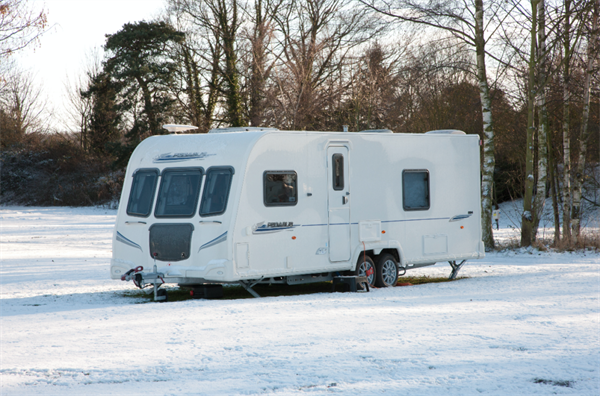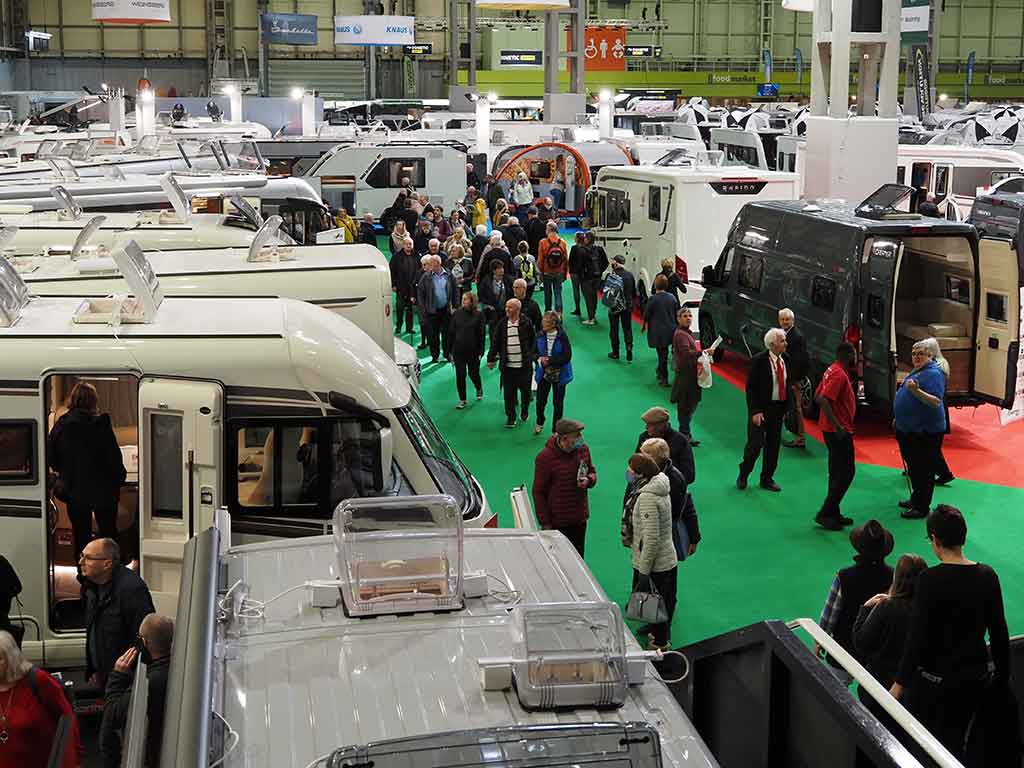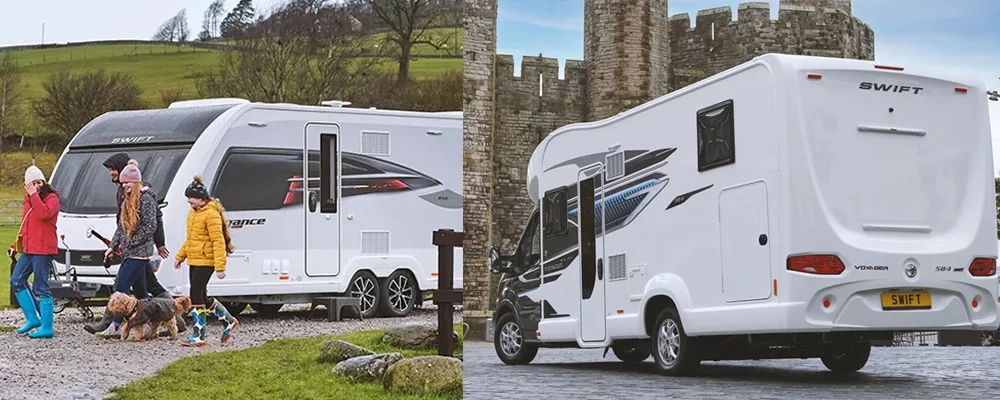Much like the people who buy them; caravans can come in all manner of shapes and sizes. Whether you’re an experienced traveller looking for luxury or a rookie camper who’s sick of creepy-crawlies and soggy tents; this guide will help you find the right caravan for you.
1. A brief history of caravans
2. A popular choice
3. Should I buy new or used
4. Caravan lingo
5. Size matters
6. Berth
7. Check the seller
8. Home sweet home
9. Servicing
A brief history of caravans:
The first luxury caravan was built in 1880 by the Bristol Carriage Company and named “Wanderer”.
Caravan holidays became popular among the wealthy around the turn of the century but by the 1930’s became more affordable and therefore more popular with the middle classes. Post-war Britain saw a boom in caravan production and better equipped caravan sites, a trend which has continued to this day. Today, over 1 million UK holiday makers are members of caravan clubs and a further 17 million Brits go camping or caravanning, every year.
A popular choice
With many homes in Britain scrutinising their budgets, caravanning offers a low-cost alternative to expensive, international holidays with any initial investment likely to be offset by future savings.
Families have plenty of options about where to go, and with over 3,000 UK sites you can take advantage of the weekend break and be back in time for work on Monday.
Should I buy new or used?
This depends entirely on your needs and circumstances. Many people choose to buy second hand for budgeting reasons, and it’s true that you can often pick up a bargain by purchasing a pre-owned vehicle. However, new builds benefit from ever-improving designs and will often come with a warranty to provide you with some peace of mind.
To help you decide you should ask yourself the following questions:
• Which caravans will my vehicle tow?
• Which layout and design suits my family’s needs?
• Would I like fixed beds or conventional beds which double as seating?
• How will I finance the purchase?
A new caravan is likely to have lots of improvements but with such high standards of manufacturing throughout the caravan industry, second-hand no longer has to mean second-rate.
Visit our brand sites now to see what options could be for you:
• www.swift-caravansales.co.uk
• www.lunarcaravansales.co.uk
• www.coachmancaravansales.co.uk
• www.spritecaravansales.co.uk
https://caravansuk.co.uk/
• www.sterlingcaravansales.co.uk
Caravan lingo
Whether you’re buying from a reputable dealer, eBay or an advertisement – it’s important get to grips with some of the terminology and technical lingo that they might use.
Actual laden weight: (ALW) is the total weight of a caravan and its contents whilst being towed.
Berth: the number of people a caravan can sleep.
Blown air heating: a system which fans warm air throughout
Breakaway cables: a safety mechanism steel cable which links the caravans’ handbrake and the tow ball.
Cassette toilet: this type of toilet has an external box where waste is stored, on the outside of the caravan.
Chemical toilet: this kind of toilet keeps waste in a sealed tank which is treated with chemicals.
Corner steady: as the name suggest this is a stabilising jack built into the corner of a caravan.
Ex-works weight: the standard weight your caravan should be when you buy it, according to specs.
Gross train weight: the total weight of your car and caravan together.
Hitch head stabiliser: a stabiliser built into the caravans hitch.
Size of Caravan
Older caravans were bulky and difficult to manoeuvre but today’s models are built in a streamlined fashion and out of lightweight materials that make them easier to handle.
If you plan on purchasing a touring caravan, it’s important to think about the type of terrain you might be travelling through. For example; narrow and mountainous roads would be unsuitable for a very broad caravan.
UK law specifies the maximum size suitable for towing as 7m length and 2.3m width.
Berth
The number of beds or berth of your caravan is dependent on the size of your family, or your number of companions. Some touring parties might choose a compact 2-berth design while others might opt for a larger more luxurious unit.
Seat-beds can double as somewhere to relax during the day and sleep at night, while bunk-beds offer a practical solution for young children to enjoy.
A large party should always remember to consider storage space when deciding on the size and berth of their caravan.
It’s worth noting that many families choose to split the cost of a static caravan between two or three couples, so as the whole family can enjoy it throughout the year – another reason why they are an economic holiday option.
Check the seller
There are plenty of benefits to buying from a dealership. They will often be the first to receive the latest models and carry a range of replacement parts or have the relationships with the manufacturer to order them in.
There will be a variety of models for you to look at and compare with your desired caravan and by inspecting other caravans you may discover new features that better suit your needs. Knowledgeable staff will be on hand to offer you tips and advice and often warranties may be provided when purchasing a new caravan.Magazines such as Practical Caravan and Go Caravan may also be able to give you a good indicator of prices, features and what models are popular within the caravanning community.
Websites like pre-loved and eBay also list different types of vans but be aware private sellers tend to want a quick-sale so information they give you might not be as reliable as advice from a dealership. Buying from a dealer ensures that your caravan is safe, functional and most importantly, legal. Grantham Caravans offer a wide range of caravans from a variety of models:
• www.swift-caravansales.co.uk
• www.lunarcaravansales.co.uk
• www.coachmancaravansales.co.uk
• www.spritecaravansales.co.uk
• www.sterlingcaravansales.co.uk
Questions before you buy
As well as buying from a reputable source, it’s important that you know which questions to ask on the day. Here are some things to consider if you are buying used caravans or nearly new:
Security
• Does the caravan match the description?
• When was the caravan last serviced?
• Has there been any attempt to change the caravan’s identification number stamped into the chassis?
• What are the moisture readings of the caravan’s interior?
• Is there a handbook?
• Is the caravan registered with CRIS (Central Registration & Identification Scheme)? – CRIS can check if a caravan has been reported lost or stolen, been written off by an insurance company or has any outstanding debts attached to it. Visit www.cris.co.uk for more.
Features
• Is the weight of the caravan suitable for the car you drive
• Is it the right size for you? Will you be able to drive safely?
• Is the condition of the interior furnishings of good standard, or what you are looking for?
• Check electrics (12v system)
• If the caravan has appliances inside then see if you can check they work.
• Look for leaks and check the taps, shower and pumps work correctly.
Exterior
• Check the age of the tyres and inspect the tread. Is there a spare?
• Does the hand brake work?
• Check couplings are smooth and lubricated
• Check road lights, are they working when connected up to your car?
• Look for signs of cracking.
Home sweet home
A caravan is an extension of your home. Most owners like to customise their caravan to reflect their interests and their personalities so take a look around your house and consider incorporating a few home comforts.
Additional products: aside from personal keepsakes, there are a number of additional products that can enhance your caravan experience and can be purchased from most dealerships and camping stores. Some products like waste bags, wheel clamps, gas bottles, alloy steps and fire safety equipment are must-haves and you should certainly consider them if they don’t come with your purchase. While other products like awnings, roof lights, outdoor furniture and kitchenware simply make your caravan experience more enjoyable. Visit our online caravan shop, Gear4Caravans, for all your caravan accessories.
Servicing
Travelling long distances in poor conditions can cause damage to any vehicle, and a touring caravan will inevitably receive more damage than a static caravan. Small problems like damp, dents, rust and leaks should be dealt with as soon as possible to avoid getting worse later on.
It is recommended that you have your caravan serviced at least once a year as this is the quietist period for caravan dealerships and will mean you don’t miss out on any holidays.
It’s also important to make sure you winter proof your caravan as cold weather is the leading cause of damp – even waterproof caravans suffer! The winter sees the rain, during the day sunshine will heat it up, and once the night time temperature drops it becomes damp again. This endless cycle really takes its toll on your poor caravan! Grantham Caravans are able to complete a moisture report on your caravan in order to detect the areas needed for drying out or treatment.
Be sure to remove all cushions, duvets and any material which you think might hold in moisture during the cold season. Grantham Caravans have developed a specialist deep clean system that can be used on bedding and furnishings to ensure best possible clean for your interior caravan. Read more on our Sleepsure service.
You should also consider removing your leisure battery and storing it at home where you can regularly recharge it. If possible, leave your handbrake off to prevent rust. Annual servicing might seem like a pain, but it will protect your investment and potentially save you a hefty amount in the long-run.





